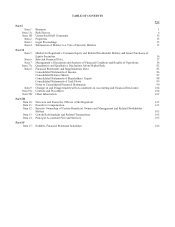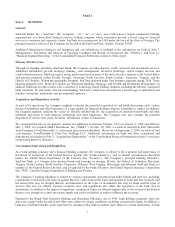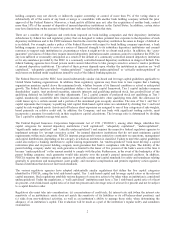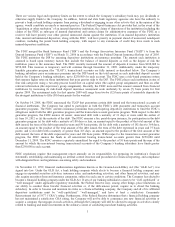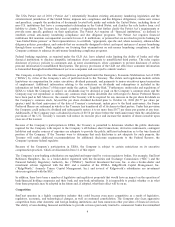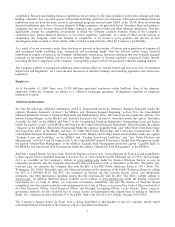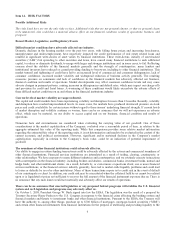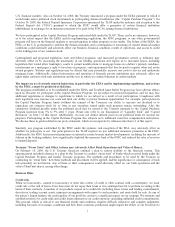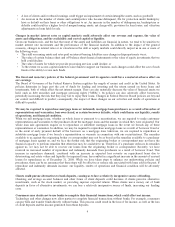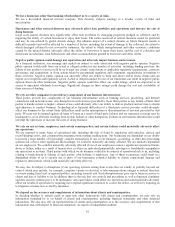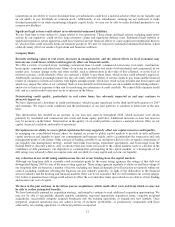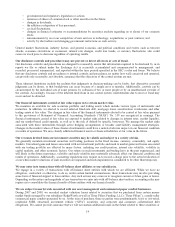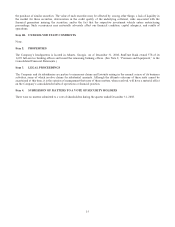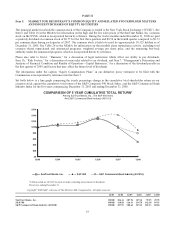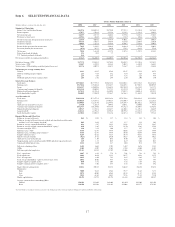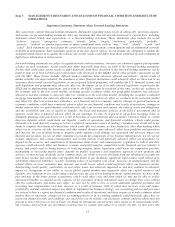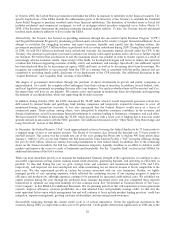SunTrust 2008 Annual Report Download - page 22
Download and view the complete annual report
Please find page 22 of the 2008 SunTrust annual report below. You can navigate through the pages in the report by either clicking on the pages listed below, or by using the keyword search tool below to find specific information within the annual report.We have businesses other than banking which subject us to a variety of risks.
We are a diversified financial services company. This diversity subjects earnings to a broader variety of risks and
uncertainties.
Hurricanes and other natural disasters may adversely affect loan portfolios and operations and increase the cost of
doing business.
Large scale natural disasters may significantly affect loan portfolios by damaging properties pledged as collateral and by
impairing the ability of certain borrowers to repay their loans. The nature and level of natural disasters cannot be predicted
and may be exacerbated by global climate change. The ultimate impact of a natural disaster on future financial results is
difficult to predict and will be affected by a number of factors, including the extent of damage to the collateral, the extent to
which damaged collateral is not covered by insurance, the extent to which unemployment and other economic conditions
caused by the natural disaster adversely affect the ability of borrowers to repay their loans, and the cost of collection and
foreclosure moratoriums, loan forbearances and other accommodations granted to borrowers and other clients.
Negative public opinion could damage our reputation and adversely impact business and revenues.
As a financial institution, our earnings and capital are subject to risks associated with negative public opinion. Negative
public opinion could result from our actual or alleged conduct in any number of activities, including lending practices, the
failure of any product or service sold by us to meet our clients’ expectations or applicable regulatory requirements, corporate
governance and acquisitions, or from actions taken by government regulators and community organizations in response to
those activities. Negative public opinion can adversely affect our ability to keep and attract and/or retain clients and can
expose us to litigation and regulatory action. Actual or alleged conduct by one of our businesses can result in negative public
opinion about our other businesses. Negative public opinion could also affect our credit ratings, which are important to its
access to unsecured wholesale borrowings. Significant changes in these ratings could change the cost and availability of
these sources of funding.
We rely on other companies to provide key components of our business infrastructure.
Third parties provide key components of our business infrastructure such as banking services, processing, and Internet
connections and network access. Any disruption in such services provided by these third parties or any failure of these third
parties to handle current or higher volumes of use could adversely affect our ability to deliver products and services to clients
and otherwise to conduct business. Technological or financial difficulties of a third party service provider could adversely
affect our business to the extent those difficulties result in the interruption or discontinuation of services provided by that
party. We may not be insured against all types of losses as a result of third party failures and our insurance coverage may be
inadequate to cover all losses resulting from system failures or other disruptions. Failures in our business infrastructure could
interrupt the operations or increase the costs of doing business.
We rely on our systems, employees, and certain counterparties, and certain failures could materially adversely affect
our operations.
We are exposed to many types of operational risk, including the risk of fraud by employees and outsiders, clerical and
record-keeping errors, and computer/telecommunications systems malfunctions. Our businesses are dependent on our ability
to process a large number of increasingly complex transactions. If any of our financial, accounting, or other data processing
systems fail or have other significant shortcomings, we could be materially adversely affected. We are similarly dependent
on our employees. We could be materially adversely affected if one of our employees causes a significant operational break-
down or failure, either as a result of human error or where an individual purposefully sabotages or fraudulently manipulates
our operations or systems. Third parties with which we do business could also be sources of operational risk to us, including
relating to break-downs or failures of such parties’ own systems or employees. Any of these occurrences could result in a
diminished ability of us to operate one or more of our businesses, potential liability to clients, reputational damage and
regulatory intervention, which could materially adversely affect us.
We may also be subject to disruptions of our operating systems arising from events that are wholly or partially beyond our
control, which may include, for example, computer viruses or electrical or telecommunications outages or natural disasters,
or events arising from local or regional politics, including terrorist acts. Such disruptions may give rise to losses in service to
clients and loss or liability to us. In addition there is the risk that our controls and procedures as well as business continuity
and data security systems prove to be inadequate. Any such failure could affect our operations and could materially adversely
affect our results of operations by requiring us to expend significant resources to correct the defect, as well as by exposing us
to litigation or losses not covered by insurance.
We depend on the accuracy and completeness of information about clients and counterparties.
In deciding whether to extend credit or enter into other transactions with clients and counterparties, we may rely on
information furnished by or on behalf of clients and counterparties, including financial statements and other financial
information. We also may rely on representations of clients and counterparties as to the accuracy and completeness of that
information and, with respect to financial statements, on reports of independent auditors.
10


